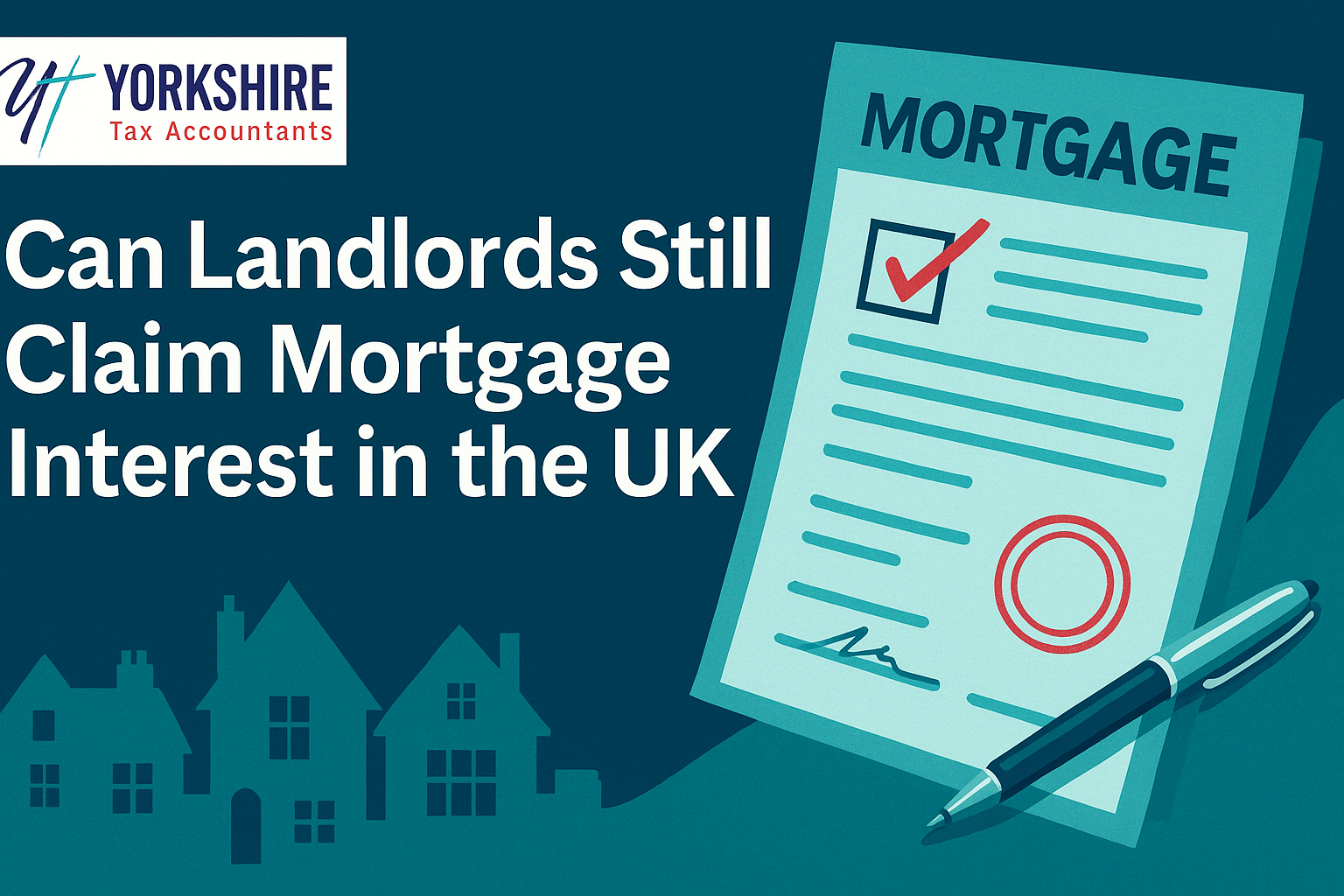
Since April 2020, UK landlords can no longer deduct mortgage interest from rental income, but they can claim a 20% basic rate tax credit instead. This change affects tax bills—especially for higher-rate taxpayers—and has led many landlords to explore incorporation for better relief. The blog explains who qualifies for the tax credit, what expenses remain allowable, how limited companies are treated differently, and practical ways to reduce landlord tax liabilities in 2024–2025. It also outlines Making Tax Digital deadlines, Capital Gains Tax rules, and penalties for late returns. Yorkshire Tax Accountants offer tailored advice to help landlords stay compliant and minimise tax.
Yes, landlords in the UK can still claim relief on mortgage interest, but not in the traditional way. Since April 2020, landlords can no longer deduct mortgage interest from their rental income to reduce their taxable profits. Instead, they receive a 20% basic rate tax credit on mortgage interest paid.
This change has significantly affected how landlords manage their rental property finances and tax liabilities.
The way landlords claim mortgage interest relief has undergone major changes since the introduction of Section 24 of the Finance (No. 2) Act 2015, commonly referred to as the "Tenant Tax."
The UK government aimed to level the playing field between homeowners and landlords, curb property speculation, and increase housing availability. While it has helped first-time buyers, many landlords have seen their profits shrink.

The 20% tax credit allows landlords to claim back 20% of their mortgage interest costs against their income tax liability, regardless of their personal income tax bracket.
This means higher-rate taxpayers no longer benefit from 40% or 45% relief on mortgage interest, which has increased tax bills for many.
One major consideration for landlords is whether to move their property portfolio into a limited company to regain full mortgage interest relief.
| Criteria | Personal Ownership (Individual) | Limited Company (Corporate) |
| Mortgage Interest Relief | 20% tax credit | Full tax deduction |
| Tax Rate on Profits | Income Tax (20%, 40%, 45%) | Corporation Tax (25% in 2025) |
| Dividend Tax on Withdrawals | N/A | Additional personal tax on dividends |
| Administration | Simpler | More complex, more costly |
| Estate Planning & Inheritance Tax | Less flexible | More flexible with shareholding |
This decision depends on several factors:
Yorkshire Tax Accountants can help you assess the pros and cons based on your unique circumstances.
Besides the mortgage interest tax credit, landlords can still claim a variety of allowable expenses to reduce their taxable rental income.
Reducing tax on rental income requires strategic planning and knowledge of available deductions.
Working with a specialist like Yorkshire Tax Accountants can help you apply these strategies effectively.
The UK government's Making Tax Digital (MTD) initiative is transforming the way landlords and small businesses manage tax reporting.
Early preparation is key to avoiding penalties and making the most of available technology.
Filing your tax return late can lead to penalties and interest charges from HMRC.
To avoid fines, landlords should organise tax records early and consider using a self assessment accountant in Yorkshire to manage submissions efficiently.
If you sell a rental property, you may face Capital Gains Tax (CGT) on the profit.
Planning your property sales carefully and timing disposals can help mitigate CGT liabilities.

As experienced landlord tax accountants in the UK, Yorkshire Tax Accountants provide tailored support for:
With a dedicated focus on landlords, property investors, and small businesses, their personalised service helps you navigate complex tax rules with confidence.
The ability to claim full mortgage interest as a deductible expense is no longer available for individual landlords. However, you can still benefit from the 20% basic rate tax credit and other allowable expenses.
For landlords seeking to reduce tax on rental income or explore limited company property investment, professional guidance is essential.
Contact Yorkshire Tax Accountants today for expert landlord tax advice tailored to your needs.
No. Since April 2020, landlords cannot deduct mortgage interest from rental income. Instead, they receive a 20% tax credit on the interest paid.
No restrictions apply to limited companies. If you own property through a limited company for property investment, you can deduct mortgage interest as a full business expense.
Yes, landlords can claim many expenses such as repairs, letting agent fees, and insurance. The key is that expenses must be wholly and exclusively for the rental business.
By maximising allowable expenses, considering incorporation, utilising spousal allowances, and getting expert tax advice from a qualified accountant.
You may have to pay capital gains tax on property UK, depending on your profit and tax band. Planning ahead can help reduce your CGT liability.